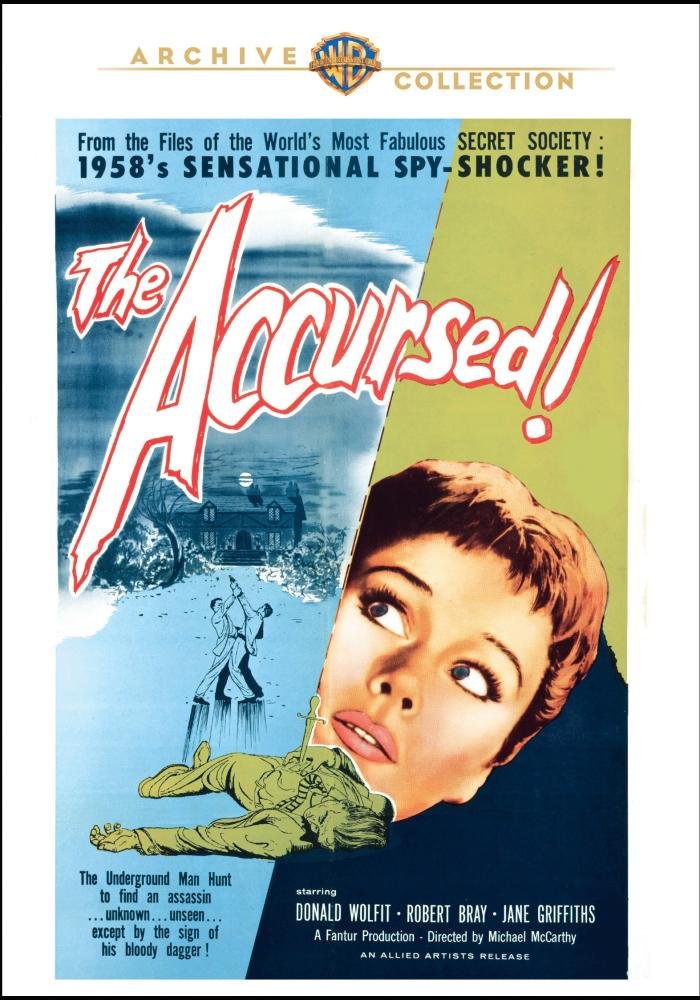
Every once in a while, something gets pried out from within cracks of time. In the instance of The Traitor – a 1957 mystery from the UK that was released in the U.S. under the more ambiguous title, The Accursed in 1958 – we have at long last been given the opportunity to see one of the few feature films made by the seemingly-promising talent of a young would-be auteur by the name of Michael McCarthy. Sadly, McCarthy’s true talent more than likely never had a proper chance to materialize, as he died at the tender age of 42 – the same year his one well-known effort (and that’s giving it a lot of credit) Operation Amsterdam was released; the rest of his stunted filmography limited to a handful of b-movies most people never saw.
The Accursed (as it shall be known as henceforth, on account that that’s the actual onscreen title with this release) is one such forgotten flick. Possessing several qualities the famous Hammer Studios are well known for – including several of its actors – the forgotten thriller finds a group of former World War II resistance fighters reuniting as they do every year in a remote British manor, hosted by Colonel Price (the one and only Donald Wolfit, who was the inspiration for Ronald Harwood’s The Dresser). But this year, the collective of anti-Nazi Germans are in for some bad news. Colonel Price has at long last discovered which one of his very dear friends is responsible for the betraying and subsequent murder of their Underground leader many moon before.
Sadly, the colonel’s messenger (the only one who possesses the name of the individual in question) is stabbed in the back as he approaches the house, and who confesses as he dies that he made a mistake somewhere along the line. And so, our hammy lead star and his guests – who range from Carl Jaffe, Anton Diffring, a then-unknown Christopher Lee (the movie was filmed in ’56), Oscar Quitak, and Karel Štěpánek – to figure out who the traitor is. The arrival of two Intelligence officers – Robert Bray and John Van Eyssen (who would soon play the doomed Jonathan Harker to Lee’s fantabulous Dracula) – determined to learn the truth to what the heck is going on themselves, adds further tension, and gives our second-billed American star a chance to woo (naturally!) the only chick in the film (Jane Griffiths).
Long story short: if this movie didn’t inspire the film adaptation of Clue, then I don’t know what did!
Rupert Davies is superbly cast as Wolfit’s butler in this enjoyable black-and-white b-grade mystery that takes place almost entirely in the same mansion – which makes one wonder if McCarthy didn’t originally pen the tale as a play. The somewhat infamous Edwin J. Fancey (who earned his notoriety after stabbing his accountant in the groin in 1940 during an argument, which resulted in the poor bookkeeper having his leg amputated!) produced this yarn, which didn’t hit US theaters until Allied Artists picked it up in 1960 – wherein the studio apparently didn’t even notice co-star Christopher Lee, or else they surely would have worked his name into the marketing – as he was already rising as the world’s top horror star at that point in time. Oops.
Another faux pas related to the history of The Accursed can be attributed to the Warner Archive Collection for releasing the film in a matted widescreen presentation. While it’s great to see the previously-unknown title on home video period, the cropping of the original 1.37:1 ratio is noticeable. I’m really not complaining, mind you, but it is pretty obvious this one has been trimmed down a bit too much. The elements used weren’t in tip-top shape to begin with, mind you: the video presentation here is rather beat up and grainy – which, of course, only adds to the fun in my opinion. The English mono soundtrack comes through just fine here, and there are no subtitle options or special features to be found.
While The Accursed might not be a must-see for all, I wouldn’t deter anyone from viewing it just the same. I certainly enjoyed it for what it was.